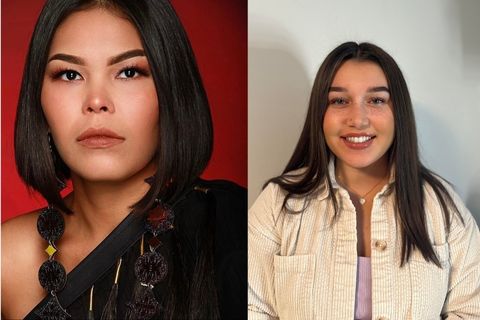Community Service-Learning receives $100,000 towards student equity awards
Chelsea Novak - 28 February 2023

Equity award recipients Roberta Alook (left) and Emma Edney (right).
For Roberta Alook, the equity award she received from Community Service-Learning (CSL) could not have been more timely. It came just in time for the holidays, and she used it to make sure that her family had a nice Christmas, despite the fact that her mother was fighting cancer.
“I was able, on my own, to plan Christmas that year and buy us a dinner … and buy gifts and everything like that, and it was actually my mom’s last Christmas,” she explains. “It was so meaningful that I was able to do that.”
This year, thanks to support from the Co-operative Education and Work-Integrated Learning Canada (CEWIL Canada) and the Canadian federal government, CSL is offering twice the number of student equity awards for students like Alook who are participating in a CSL course in the winter 2023 term.
First offered last year, the CSL Student Equity Award was conceived as a way to aid students from equity-deserving backgrounds or identities without fundamentally altering the CSL concept, which is built on the premise that students are volunteers.
“Because they’re not being paid to go into communities to do this work, it’s all about time and money,” says David Peacock, director of the CSL program. “If we can build the program by enabling students to have an award if they come from one of those equity-seeking backgrounds, then we’re expanding access, opportunity and then success for those students.”
Building relationships
Alook is doing a combined degree in Native Studies and education, and is majoring in Cree language. Last year she took CSL 100: Introduction to Community Engagement, and volunteered with The Learning Centre Literacy Association (TLCLA), which helps adults develop their literacy and numeracy skills.
“I went into the classroom and helped as a teaching assistant, and participated in some of the activities with the community members,” Alook explains.
She even had the opportunity to teach some Cree words and syllabics. But what Alook found really valuable about the experience was the opportunity to develop relationships.
“It was a really good way for me to connect with the community and all the people who work at TLCLA,” she says. “It was really nice because I made friends with the staff and with a lot of the people who accessed the programs at that time, and it really taught me a lot as a volunteer.”
Peacock confirms that building relationships with people outside of the university is one of the benefits of CSL courses.
“Sometimes when you’re a university student it can seem like you’re studying abstract, theoretical work and you can’t see any purpose for it outside of the university; you aren’t connected with relationships and with people outside the very small world of the university,” he says. “Community-engaged learning helps students create those relationships, which expands opportunities for them into the future.”
Engagement beyond university
Emma Edney says her background isn’t traditionally that of a university student: she comes from a single-parent home, is a woman of colour and has been working while attending classes. She’s also been volunteering her time with local community organizations as a CSL student, and was happy to win an equity award.
“This has allowed me to alleviate some of that stress and volunteer more with community partners,” she says.
Edney is a third-year criminology student and took her first CSL course in January 2021, volunteering with the Youth Restorative Action Project (YRAP). The organization is a Youth Justice Committee that takes a restorative justice approach to aiding youth in the community.
“I started just doing mentorship and panel training with youth and now I’m all the way up to being on the board of directors,” says Edney.
YRAP isn’t the only CSL community partner she’s still involved with.
Last year, Edney took CSL 200: Theory and Practice in Community Service-Learning and volunteered for the Fyrefly Institute for Gender and Sexual Diversity, which was still operating under the name of the Institute for Sexual Minority Studies and Services (or iSMSS) at the time. The institute provides programs and services to support the 2SLGBTQ+ community and allies.
As part of her placement, Edney volunteered for the Alberta Gender Identity and Sexual Orientation Students Alliance (GSA) conference.
“Not gonna lie, I did have a few tears,” she says. “It was definitely so moving hearing people’s stories and their journey.”
The experience had such an impact on Edney that she still volunteers for the conference.
Both Edney and Alook recommend the CSL program to other students.
“It’s so worth it, because not only do you get a certificate, but it’s just volunteering alongside your degree,” says Edney. “I have so many courses where there’s an exam and then it’s over. CSL allows you to go into the community and volunteer, and it relates to your course and can relate to your degree.”